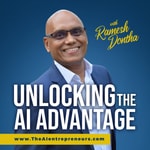Razib Khan's Unsupervised Learning – Détails, épisodes et analyse
Détails du podcast
Informations techniques et générales issues du flux RSS du podcast.

Razib Khan's Unsupervised Learning
Razib Khan
Fréquence : 1 épisode/7j. Total Éps: 200

Classements récents
Dernières positions dans les classements Apple Podcasts et Spotify.
Apple Podcasts
🇨🇦 Canada - lifeSciences
29/07/2025#43🇬🇧 Grande Bretagne - lifeSciences
29/07/2025#52🇩🇪 Allemagne - lifeSciences
29/07/2025#54🇺🇸 États-Unis - lifeSciences
29/07/2025#19🇫🇷 France - lifeSciences
29/07/2025#42🇨🇦 Canada - lifeSciences
28/07/2025#29🇬🇧 Grande Bretagne - lifeSciences
28/07/2025#36🇩🇪 Allemagne - lifeSciences
28/07/2025#60🇺🇸 États-Unis - lifeSciences
28/07/2025#20🇫🇷 France - lifeSciences
28/07/2025#34
Spotify
Aucun classement récent disponible
Liens partagés entre épisodes et podcasts
Liens présents dans les descriptions d'épisodes et autres podcasts les utilisant également.
See all- https://chat.openai.com/
701 partages
- https://www.effectivealtruism.org/
699 partages
- https://substackcdn.com/image/fetch/w_1456
500 partages
- https://en.wikipedia.org/wiki/Elon_Musk
121 partages
- https://en.wikipedia.org/wiki/The_Guardian
28 partages
Qualité et score du flux RSS
Évaluation technique de la qualité et de la structure du flux RSS.
See allScore global : 68%
Historique des publications
Répartition mensuelle des publications d'épisodes au fil des années.
Noah Carl and Bo Winegard: probing the intellectual darker web
Saison 1 · Épisode 247
vendredi 30 mai 2025 • Durée 01:54:24
On this episode of Unsupervised Learning, Razib talks to Bo Winegard and Noah Carl, the editors behind the online publication Aporia Magazine, founded in 2022. Winegard and Carl are both former academics. Winegard has a social psychology Ph.D. from Florida State University, and was an assistant professor at Marietta College. He was an editor at Quillette before moving to Aporia. Carl earned his Ph.D. in sociology from Oxford University. He was a research fellow at St. Edmund’s College, Cambridge, before becoming a contributor to The Daily Skeptic and UnHerd, and a managing editor at Aporia.
First, Razib asks Winegard and Carl about their respective cancellations, and the recent attacks on Aporia from the British media in particular. Winegard observes that many of the criticisms were muddled, as journalists struggled to get basic facts straight about who did what, as well as mixing up present associations among various editors with past ones. The two also address the change in the culture over the last few years, as cancellations seem to have lost some of their bite. Then Razib asks Winegard about the perception that Aporia is fixated on the third-rail of American culture: race and IQ, and its relevance to social policy and politics. Winegard talks about how he has long since said everything he has to say on the topic, but he still finds that the public conversation fails to address the possibility of cognitive differences between populations, and so keeps finding himself wading back in, to fill a gap in the discourse. Razib also asks the editors about their view of “cold winters theory,” which attempts to explain the higher IQs of temperate zone populations versus tropical ones.
Then they discuss the disappointments of the MAGA movement, and its appeal to populist emotion. Winegard had hoped that despite its inchoate nature, it might have been able to pare back the radical excesses of the progressive cultural changes of the 2010’s, but now he worries that overreach may up the chances that woke policies make a comeback with the inevitable political backlash in the next few years. Winegard also addresses his personal souring on reflexive anti-wokism, and Carl shares his own views from across the Atlantic, where Britain appears to follow in the US’ footsteps, even if from an entirely different social-historical context. Winegard discusses the difficulties of maintaining a consistent heterodoxy in the face of tribalistic demands for conformity. Finally, they discuss the path forward for publications like Aporia that do not toe any particular party line.
Tim Lee: 2025 and the driverless car revolution
Saison 1 · Épisode 246
samedi 24 mai 2025 • Durée 55:46
Today Razib talks to Tim Lee, a previous guest on Unsupervised Learning. Lee hosts Understanding AI. Lee covered tech more generally for a decade for Washington Post, Ars Technica, and Vox.com. He has a master's degree in computer science from Princeton. Lee writes extensively about general AI issues, from Deep Research’s capabilities to the state of large language models. But one of the major areas he has focused on is self-driving cars. With expansion of Waymo to Austin, and this June’s debut of Tesla’s robotaxis, Razib wanted to talk to Lee about the state of the industry.
They discuss the controversies relating to safety and self-driving cars. Is it true, as some research suggests, that Waymo and self-driving cars are safer than human-driven cars? What about the accidents Waymos have been implicated in? Is it true that they were actually due to human error and recklessness, rather than the self-driving cars themselves? Lee also contrasts the different companies’ strategies in the sector, from Waymo to Zoox to Tesla. Razib also asks him about the fact that self-driving cars’ imminent arrival seems to have been overhyped five years ago, with Andrew Yang predicting trucker mass unemployment, to the reality that Waymo has now surpassed Lyft in ride volume in San Francisco. They also discuss the limitations of self-driving cars in terms of their ability to navigate cities and regions where snow might be a major impediment, and why there has been a delay in their expansion to freeway routes.
Zineb Riboua: realism in foreign policy in 2025
Saison 1 · Épisode 237
jeudi 17 avril 2025 • Durée 01:07:28
Today on Unsupervised Learning Razib talks to Zineb Riboua, a research fellow and program manager of Hudson Institute’s Center for Peace and Security in the Middle East. She specializes in Chinese and Russian involvement in the Middle East, the Sahel, and North Africa, great power competition in the region, and Israeli-Arab relations. Riboua’s pieces and commentary have appeared in the Wall Street Journal, Foreign Policy, the National Interest, the Jerusalem Post and Tablet among other outlets. She holds a master’s of public policy from the McCourt School of Public Policy at Georgetown University. She did her undergraduate studies in France, where she attended French preparatory classes and HEC Paris’ Grande Ecole program. Her Substack is Beyond the Ideological.
Razib and Riboua discuss the Trump administration’s theory of tariffs as a tool of foreign policy and his attitudes toward multilateral diplomacy. They explore whether any principle beyond power and dominance underlies the current administration’s approach, and consider the role of principles and values in foreign policy. Riboua elaborates a realist perspective in line with the thinking of Henry Kissinger. States have interests and abilities to execute on those interests; idealism is secondary. Riboua also discusses the fact that Trump seems attuned to how foreign politicians relate to the American domestic scene. He seems willing to punish those abroad whom he perceives to be favorable to his political enemies and reward those who are personally favorable toward him. Razib then asks Riboua about the geopolitics of her native Morocco, a relatively stable monarchy on northwest Africa’s edge that has promoted moderate Islam, a good relationship with Europe and maintained a stable democracy.
Katherine Dee: Is Twitter just our default?
Saison 1 · Épisode 148
mercredi 13 septembre 2023 • Durée 01:08:26
On this episode of the Unsupervised Learning podcast, Razib talks to internet commentator formerly known as default friend who is perhaps better known today as the internet culture writer Katherine Dee. Dee is a regular contributor to Retvrn, The Washington Examiner, The American Mind, Tablet Magazine and UnHerd. She has also recently written a piece for Compact: Why You’re Never Leaving Twitter.
But first, Razib and Dee discuss how they have known each other for nearly a decade, going back to 2015 on the site formerly known as Twitter, and more substantially as residents of Austin in the late teens. Since 2019 Dee's existence has been a peripatetic one; after leaving Texas and first moving to the Bay Area, she then lived in the Pacific Northwest, before finally settling in Chicago. Working in advertising, and then in big tech, Dee has finally settled on a career as a freelancer, with all the freedom and uncertainty that entails.
Razib asks Dee whether there is today, in 2023, any culture that isn’t somehow connected to the internet. She agrees about the pervasive nature of digital and social media, and how thickly it is interleaved into the lives of younger Millennials and Zoomers. And yet as a counterpoint to this conception of a revolution that has transmuted “IRL” life online, Razib argues that social media is just an amplification of “bulletin board system” (BBS) culture which existed as early as the 1980’s. Dee then reflects on her maturation as an observer of all things internet through Twitter and Discord, and the shadow-impact of more obscure platforms like Tumblr and 4chan on our broader culture, beneath the notice of the wider population of “normies,” while Razib reminds her how small Twitter’s user base is compared to platforms like Facebook or YouTube (the latter are measured in billions, while Twitter retains some 450 million active users).
In her piece, Why You’re Never Leaving Twitter, Dee argues that the anemic showing of dozens of Twitter clones and pretenders in the last decade argues that the platform just isn’t going to be dethroned from its central role in the media, and thereby wider American culture. From right-wing to left-wing imitators, or Facebook’s Threads, every challenger has failed to eat into Twitter’s critical position as a nexus in the media ecosystem, a central node in transmitting information throughout diverse subcultures. But Razib plays devil's advocate, musing whether Elon Musk’s erratic tenure since assuming ownership of the platform, his change of its brand to X, his petty beefs with publishers like Substack and ex cathedra pronouncements of major feature changes, might actually spell the end of the platform. Though Dee seems skeptical that even Musk could destroy his new property, not seeing any replacement on the horizon, suggests to her that the age of a single central information switchboard for the internet may be ephemeral and one we look back on as a particular and unique moment in history, just as we do the age of three major television networks in the 20th century.
Inez Stepman: fixing higher education
Saison 1 · Épisode 147
mardi 12 septembre 2023 • Durée 01:10:33
Today Razib talks to Inez Stepman, a senior policy analyst at the Independent Women’s Forum, a Lincoln Fellow with the Claremont Institute and a senior contributor to The Federalist. Stepman also hosts two podcasts, High Noon and Clown Car. She and Razib first discuss the current distress, both economic and cultural, in higher education as several decades of bloat, inflation-beating cost increases and political radicalism run up against their natural limits. Stepman’s recent policy report, Taxing Universities, tackles the massive fiscal bill that the American people will face in the next generation as bad loans backed by the federal government finally come due. Razib admits that as a member of “Generation X” he was unaware of the massive change in educational debt since the public sector took over almost all lending after the 2008 financial crisis. A graphic that illustrates the impending crisis comes from The New York Times:
https://www.nytimes.com/interactive/2023/07/13/opinion/politics/student-loan-payments-resume.html
The takeaway is that student loans originated from 2009 onward exhibit a pattern where Latinos, blacks, and nearly half of women, owe more now in 2023 than when they began payments after graduation. Stepman discusses the broader reasons for this dynamic, the expansion of higher education, the rise of credentialing in lower-paying “pink collar” jobs that saddle people with debt they can’t service and an evidence-free elite consensus that more education results in more value and skills. In contrast to the current orthodoxy, Razib argues that the bachelor’s degree is often simply a signaler of intelligence and conscientiousness, and the expansion of this diploma to nearly half the youngest age cohort has diluted its utility.
In the second half of the podcast, Razib probes Stepman on how she arrived at a relatively conservative cultural stance despite being a secular native of Palo Alto, California, and a current resident of Manhattan. Stepman’s starting point is that males and females are fundamentally different because of our biology, and we must organize human societies around this fact, rather than attempting to ignore this reality while striving for an egalitarian utopia. Stepman calls herself an anti-feminist because she believes that this denial of human nature goes back to the beginning of the movement, with the publication of Mary Wollstonecraft’s The Vindication of the Rights of Women in 1792.
Cory Clark: adversarial collaborations in science
Saison 1 · Épisode 146
mardi 12 septembre 2023 • Durée 01:04:23
This is where you will find all the podcasts from Razib Khan's Substack and original video content.
On this episode of Unsupervised Learning Razib talks to Dr. Cory J. Clark, a behavioral scientist and executive director of the Adversarial Collaboration Project at the University of Pennsylvania. Clark got her Ph.D. in social psychology at UC Irvine, but her interests have broadened over her career as is clear in a diverse oeuvre.
First, Razib and Clark talk about the culture of self-censorship within science due to politicization and intra-scientific politics. They discuss whether fraud is more damaging to the career of a senior or junior scientist, and the crisis coming for behavioral economics in the wake of the Francesco Gino and Dan Ariely ethics scandals. While Razib offers the prescription of viewpoint diversity, Clark argues that a recommitment to objectivity and truth as the fundamental values of science is needed. They then move on to her major current project on “adversarial collaboration.” Whereas in “normal science” two rival research groups may hold to conflicting hypotheses for decades, with outsiders unable to adjudicate, Clark argues that researchers with differing views should come together to converge upon the truth.
Her interest in the culture of science leads naturally to a broader concern about human cultural equilibria. In The Evolution of Relentless Badassery, Clark argues that a particular personality type is socially and evolutionarily favored. Razib and Clark discuss whether we live in a time of peace so that disagreeable violent characters are at a low ebb in their stature, and perhaps in the face of cultural chaos the “badass,” figures like Michael Corleone in The Godfather films may reemerge to establish order and ruthless justice.
The discussion loops back to a consideration of the values that unite scientists, and the cultural and political winds moving through the profession that might threaten to blow it off course as an enterprise, might leave it more a social club than a venerable institution to generate information. Clark is candid that she is not sure she would recommend heterodox students even attempt to join the academy.
Alex S. Young and James J. Lee: quantitative genetics in 2023
Saison 1 · Épisode 145
dimanche 3 septembre 2023 • Durée 02:06:15
On this episode of Unsupervised Learning Razib talks with Alex Young of UCLA and James Lee of the University of Minnesota about quantitative genetics and its relationship to complex traits and the genomic revolution. Young, trained as a mathematician, and Lee, trained as a psychologist, have both converged upon research programs exploring the role of genetics in generating variation in human behavior and disease. First, the trio reviews quantitative genetics’ modern basis in R. A. Fisher’s 1918 paper The Correlation between Relatives on the Supposition of Mendelian Inheritance, and how the field emerged from the same intellectual root as population genetics in the first decades of the 20th century. They then discuss phenomena closely associated with quantitative characteristics: polygenicity, heritability and the central limit theorem. Razib also outlines the role of population genetic parameters like mutation, selection and drift in shaping the distribution of any given trait, particularly the characteristic’s variation and median values.
After a deep dive into major concerns like the difference between heritability in the “broad sense” and “narrow sense,” what additive genetic variance is and why it’s so important to evolution and applied breeding and contemporary heritability estimates of traits like height and intelligence using twin studies and family-based genomic analyses, the conversation concludes with a discussion of Gregory Clark’s new PNAS paper, The inheritance of social status: England, 1600 to 2022. What are its implications? Why did it ignite a firestorm on social media? Lee in fact contributed a comment on the paper to PNAS, while Young has tackled its methods and conclusions on social media.
In a conversation that stretches on for over two hours, Razib, Lee and Young touch upon many aspects of a discipline that combines the statistical insights of the 20th century with the genomic technologies of the 21st. Lee also expounds on a result from one of his papers that didn’t make it into the final publication due to reviewer skepticism: what he calls a “beer-chugging phenotype” reported from the study of twins.
Diana Fleischman: evolution, sex and eugenics
Saison 1 · Épisode 144
mercredi 30 août 2023 • Durée 54:05
On this episode of Unsupervised Learning Razib talks to Aporia Magazine’s Diana Fleischman, an evolutionary psychologist who earned her Ph.D. in David Buss’ lab at the University of Texas in Austin. Fleischman discusses the origins of her field, its methodological framework and presuppositions, and why evolutionary psychologists seem obsessed with sex. Razib also brings up the relationship of evolutionary psychology to primatology and the role that behavioral studies of common chimpanzees and bonobos play in understanding what Jared Diamond termed the “third chimpanzee,” humans. They then circle back to the importance of the reality of heritable “hard-wired” behaviors in evolutionary psychology, and its relationship to behavior genetics.
Fleischman and Razib then move on to eugenics and the controversy that ensued after Fleischman’s piece You’re probably a eugenicist. They wonder how narrowly to constrain the term; for example, is the ubiquitous termination of fetuses with Down Syndrome eugenic if those individuals brought to term cannot themselves reproduce? Is selection for intelligence and height in your marriage partner eugenical? Razib and Fleischman also talk about the eugenical impact of abortion, including the decline of crime, and why the Left does not talk extensively about this topic. Fleischman discusses eugenics’ future with the rise of reproductive technology and a more detailed understanding of complex trait architecture. The possibility of embryo selection's rise brings up concrete concerns and resurrects the specter of bottom-up eugenics, despite the abolishment and banning of top-down eugenics. Fleischman and her co-authors tackle embryo selection for complex traits in a recent piece in Aporia.
Nicola Buskirk: old books for a new generation
Saison 1 · Épisode 143
jeudi 24 août 2023 • Durée 01:22:39
This is where you will find all the podcasts from Razib Khan's Substack and original video content.
On this episode of Unsupervised Learning Razib talks to Nicola Buskirk of Elessar Books (see her Substack). A 2022 graduate of Stanford University, Buskirk has already had positions at Substack (she was behind the At Length series), Thiel Foundation, Hoover Institution and now, Protocol Labs. At Elessar she is “putting long out-of-print books back into print so that they may be easily read and studied by a new generation of readers.”
Before asking about her new project, Razib asks her about Elessar, an alternative name for the character known as Aragorn. They discuss why J. R. R. Tolkien’s The Lord of the Rings series, written in the first half of the 20th century, appeals to young people born in the 21st century. Buskirk believes that much of the attraction is in Tolkien’s depiction of good and evil in a manner that edifies and educates but with subtlety and complexity. They discuss the differences between Tolkien’s fantasy writing style, and that of his colleague and friend C. S. Lewis, whose Narnia series was far more nakedly allegorical than The Lord of the Rings . Razib and Buskirk also discuss whether Tolkien’s work was fundamentally Roman Catholic, as the author claimed, or whether its purview is broader, explaining its lasting appeal. They also touch upon the relationship of the films to the books, and how Peter Jackson pulled off the sort of adaption that Amazon failed at.
Then the conversation shifts to why Buskirk began Elessar Books, the resurfacing of knowledge and wisdom for a generation weaned on smartphones and addicted to TikTok. She talks about conversations with peers where they were amazed by her insights, even though she freely admitted to them that she simply stood on the shoulders of the ancients, whose ideas are freely available in older books. Razib and Buskirk discuss if what Antonio Garcia Martinez calls the age of orality is a reversion to preliterate and frankly more primitive modalities of thought, and her attempt to resurrect, maintain and perpetuate a culture of deep literacy among her technology-addicted generation.
Hannah Frankman: unlearning the lessons of the past
Saison 1 · Épisode 142
mardi 22 août 2023 • Durée 01:16:59
This is where you will find all the podcasts from Razib Khan's Substack and original video content.
On this week’s episode of Unsupervised Learning Razib talks to Hannah Frankman about the past, present and future of education. Frankman is a Hazlitt Fellow at the Foundation for Economic Education, the founder of Rebel Educator, and the host of an eponymous podcast (Spotify, Apple and YouTube). Education as a discipline has been a human concern since Plato outlined an idealized system of universal pedagogy in The Republic, later to be rejected by his pupil Aristotle's lost treatise On Education in favor of a more targeted and elitist system.
In the American context, the field has been riven by tensions between the bottom-up forces that encouraged a well-informed citizenry, resulting in New England being the world’s first universally literate society, and top-down political forces that led to the growth of secular and universal public education in the 19th century. Beginning in March 2020 the world of education came into our living rooms as the COVID-19 pandemic sent students out of the classroom into the alternative universe of “zoom school,” bringing parents face to-face with the day-to-day of the current educational framework.
For many Americans, the chaos and trials of the pandemic years have them reconsidering schools and entertaining alternatives to the current system, which seemed so unprepared for the exigencies of the present. Frankman believes her non-traditional background equips her to understand the challenges of our current era, first being homeschooled, and then going straight into the workforce with Praxis, a college alternative that fosters skills that enable entrepreneurship in young people. She explains exactly what homeschooling in the American context means, from those motivated by religious concerns who mimic much of the curriculum of traditional institutions and simply modify or supplement it with Christian materials, all the way to “unschooling,” whereby students are much more self-guided and undirected. Frankman also recounts her own personal experiences with nontraditional education, the pitfalls and benefits, and why she left the traditional path when she was just six years old. They then discuss the reality that the last few years have seen crashing test scores across the countries and a widespread realization that aspects of the traditional system that might have been well geared toward producing factory workers in the 20th century may be ill-suited to the “information economy” of the 21st century. Frankman makes the case for a diversity and pluralism of responses, and she and Razib talk about various paths that other nations have taken, including the more structured systems of East Asia. Finally, they discuss the future of Rebel Educator, and her vision for a future of American education focused on choice, experimentation and flexibility better suited to our current learning options and the needs of a modern economy.









